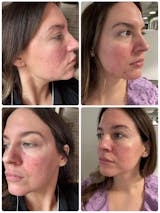
The days are getting warmer, which means summer’s inching closer! While we count down to sunshine, road trips, and indulging on a little too much ice cream, you might be wondering if it’s time to drop the moisturizer you’ve built into your skincare routine over the last few months.
As Spice Girls sang it: Stop right now, thank you very much.
For most of us, moisturizers are must-haves all year round – yes, even during summer and even when your skin has seemingly (more than) enough oil.
How Do Moisturizers Work?
Moisturizers keep skin nourished by increasing moisture levels and repairing the skin’s natural protective barrier. There are three main types of ingredients in moisturizers that make them the magical, skin-loving potions they are:
Humectants pull water into the skin cells and keep it there.
Examples include hyaluronic acid, glycerin, and alpha hydroxy acids.
Occlusives form a barrier on the skin to lock in hydration and prevent water loss.
Examples include dimethicone, lanolin, and squalene.
Emollients fill in the spaces between rough or peeling skin cells to make skin feel smoother.
Examples include ceramides and oleic acid.
How Do Moisturizers Work?
Moisturizers keep skin nourished by increasing moisture levels and repairing the skin’s natural protective barrier. There are three main types of ingredients in moisturizers that make them the magical, skin-loving potions they are:
Humectants pull water into the skin cells and keep it there.
Examples include hyaluronic acid, glycerin, and alpha hydroxy acids.
Occlusives form a barrier on the skin to lock in hydration and prevent water loss.
Examples include dimethicone, lanolin, and squalene.
Emollients fill in the spaces between rough or peeling skin cells to make skin feel smoother.
Examples include ceramides and oleic acid.
Why Should I Moisturize?
Your skin’s number 1 function is to protect your face and body from external stressors and excessive water loss1. When applied to skin regularly, moisturizers are like the hardworking assistant giving your skin the support it needs to excel at doing what it does. Moisturization is essential in protecting skin, making it smooth and soft, increasing hydration, and delivering key active ingredients to the skin1,2.
Let’s take a deep dive into five reasons to moisturize this summer – even when you have oily, acne-prone skin:
#1 Moisturizers give your skin a layer of protection.
The summer means more time spent outdoors. While SPF should be your top go-to this season to protect your skin from harsh UV rays, your moisturizer will be a close second to lend an extra hand in reinforcing your skin’s barrier and shielding it from any harmful irritants lurking in the environment 1, such as the city’s air pollution.
#2 Moisturizers keep skin hydrated, healthy, and young.
Do you foresee the AC being on full blast this summer? The lower levels of humidity can cause skin to lose moisture and dehydrate it. For our skin to feel smooth and supple, the outer layer of our skin has to ideally be 20% to 30% water3.
While dry skin is a skin type where there’s isn’t enough oil produced, dehydrated skin is a temporary condition where there’s a lack of water. If you have oily skin, but find that your skin feels tight with a dull complexion, you could have dehydrated, oily skin.
If thirsty skin isn’t hydrated in time, your skin is at greater risk of inflammation, infection, wrinkles, and premature aging4. This is why moisturizing is recognized as the first anti-aging skincare1.

#3 Moisturized skin could mean fewer breakouts.
When you have oily skin, you may think a moisturizer will only add more unnecessary oil to your skin, leaving it looking shinier than you’d like this summer. The good news is, there are oil-free moisturizers out there that can keep skin hydrated without the greasy, sticky feeling.
In fact, if you have acne-prone skin, you might find moisturizing twice a day can lead to fewer breakouts. This is because not moisturizing means your skin has to produce more oil to make up for the lack of moisture. This extra oil leads to clogged pores which can then lead to acne 5. Studies have even found that most acne patients see less acne between 4 and 8 weeks after beginning to use an acne-friendly moisturizer 5 (note the moisturizer is part of a dermatologist-prescribed acne treatment plan that included acne medication, a cleanser, and a moisturizer).
#4 Moisturizers make powerful acne products more tolerable.
While the retinol in our pore-purging, acne-targeting Clear Out is formulated to be effective yet gentle, if you are using other acne products or treatments that are strong, you might find that they are drying or irritating your skin5. Using a moisturizer every day and night can help your skin tolerate these ingredients better and minimize your experience of the side effects.
#5 Moisturizers carry the good stuff to skin.
Moisturizers are often formulated with key active ingredients that are then carried to the skin. These ingredients may be vitamins, antioxidants, peptides, or anti‐inflammatories2 that can address your specific skin concerns and help you reach your skin goals.
Choosing the Right Moisturizer for You

If you have oily skin, the last thing you want is to make your skin feel even more oily by using a heavy, creamy moisturizer. This is where oil-free, non-comedogenic moisturizers come in!
The Matte Hydrator is a light, hydrating serum that gives your skin all the moisture it needs without giving you an oily sheen. The formulation uses 100% medical-grade Ultra Low Molecular Weight hyaluronic acid that can hold 1000x its weight in moisture, leaving your skin amply hydrated.
If you have dry skin, you are most probably in need of a moisturizer formulated with occlusives to lock in hydration.
The Protective Moisturizer keeps skin nourished and is at the same time loaded with peptides and resveratrol, a potent antioxidant. While the peptides work to repair skin and strengthen the skin barrier, resveratrol works to relieve redness and protect your skin from harmful agents in the environment.
If you have normal or combination skin, it is likely that both the Matte Hydrator and Protective Moisturizer are suitable for you. Ultimately, it is about what your skin needs and what feels best for you. You could even combine them both for an extra boost of hydration!
Whichever moisturizer you choose, the best time to apply it is after cleansing your face in the day and night, when the skin is still a little damp.
Remember: it’s all about getting the moisture in, and keeping it in.
Want personalized advice on which moisturizer your skin will love most?
Get in touch with us on Messenger chat or Instagram DM (@clearlybasics).
References
- F.Bonté, 2011: Skin moisturization mechanisms: New data
- Zoe D Draelos MD, 2018: The science behind skin care: Moisturizers
- Harvard Health, 2019: Moisturizers: Do they work?
- Angela Palmer, 2020: Does Oily Skin Need a Moisturizer?
- American Academy of Dermatology: Moisturizer: Why you may need it if you have acne
Disclaimer: This article should not be interpreted as personal medical advice. For medical-related matters, please consult your dermatologist.






